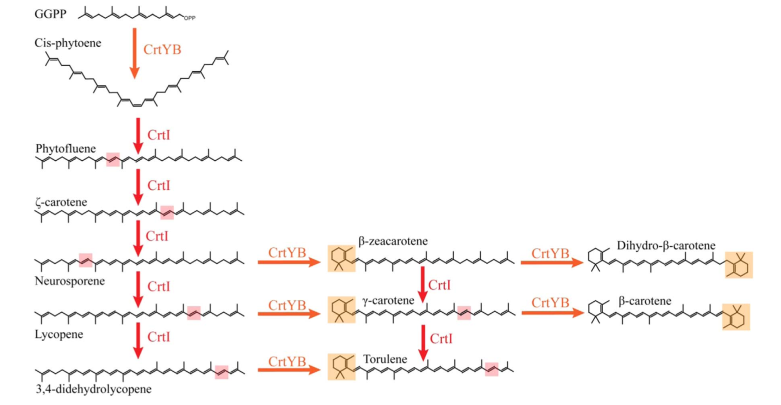Difference between revisions of "Part:BBa K2407309"
| Line 13: | Line 13: | ||
===''Characterisation''=== | ===''Characterisation''=== | ||
<p style="text-indent: 40px"> | <p style="text-indent: 40px"> | ||
| − | Since the | + | Since the CrtI (phytoene desaturase) is a part of the biosynthesis pathway of carotenoids (fig. 1), it is often co-expressed with the other enzymes of the pathway: such as CrtB or CrtY. Rabeharindranto et al. analyzed the expression of single domain CrtI, CrtY, and CrtB (fig.2). CrtB is unambiguously detected as an intense bands in all strains B, B/I or Y/B/I. On the other hand, CrtI can be observed at the expected size (67kDa) only when coexpressed with CrtY domain (strain Y/B/I). The explanation could be that CrtI protein needs to be co-expressed together with CrtY to have a normal production/stability. A faint band with 50kDa migration pattern could be observed in B/I strain which could further support the idea of low production or stability of CrtI in absence of CrtY.</p> |
| − | Rabeharindranto et al. analyzed | + | |
| + | [[File:K3570011-1.png|500px|thumb|center|Fig. 1: From Rabeharindranto et al. 2019. Presumed biosynthetic pathway for the synthesis of β-carotene in X. dendrorhous (Verdoes et al., 1999). The bifunctional lycopene cyclase/phytoene synthase (CrtYB) enzyme is depicted in orange, the phytoene desaturase enzyme (CrtI) is depicted in red. Orange or red boxes represent the localization of the modifications introduced by the CrtYB or CrtI enzymes respectively.]] | ||
| + | |||
| + | [[File:BBa K2407309-1.png|500px|thumb|center|Fig. 2: From Rabeharindranto et al. 2019. Expression of the different constructs in crude extracts detected in western blots. For other details, please refer to [1] ]] | ||
===''References for Toulouse_INSA-UPS 2020's contribution''=== | ===''References for Toulouse_INSA-UPS 2020's contribution''=== | ||
Revision as of 18:23, 8 October 2020
crtI
Toulouse_INSA-UPS 2020contributed to the characterisation of this part by adding a new documentation learned form literature on the expression and stability of CrtI.
(--antonmykhailiuk 19:10, 08 October 2020 (UTC+2))
crtI encodes desaturase, which is able to convert phytoene into lycopene through two steps. It is the key factor in the synthesis of carotene from X. dendrorhous.
Contribution from other teams
Toulouse_INSA-UPS 2020's contribution
Characterisation
Since the CrtI (phytoene desaturase) is a part of the biosynthesis pathway of carotenoids (fig. 1), it is often co-expressed with the other enzymes of the pathway: such as CrtB or CrtY. Rabeharindranto et al. analyzed the expression of single domain CrtI, CrtY, and CrtB (fig.2). CrtB is unambiguously detected as an intense bands in all strains B, B/I or Y/B/I. On the other hand, CrtI can be observed at the expected size (67kDa) only when coexpressed with CrtY domain (strain Y/B/I). The explanation could be that CrtI protein needs to be co-expressed together with CrtY to have a normal production/stability. A faint band with 50kDa migration pattern could be observed in B/I strain which could further support the idea of low production or stability of CrtI in absence of CrtY.

References for Toulouse_INSA-UPS 2020's contribution
- [1]Rabeharindranto, H., Castaño-Cerezo, S., Lautier, T., Garcia-Alles, L. F., Treitz, C., Tholey, A., & Truan, G. (2019). Enzyme-fusion strategies for redirecting and improving carotenoid synthesis in S. cerevisiae. Metabolic Engineering Communications, 8, e00086. https://doi.org/10.1016/j.mec.2019.e00086
Sequence and Features
- 10COMPATIBLE WITH RFC[10]
- 12COMPATIBLE WITH RFC[12]
- 21INCOMPATIBLE WITH RFC[21]Illegal BglII site found at 204
- 23COMPATIBLE WITH RFC[23]
- 25COMPATIBLE WITH RFC[25]
- 1000INCOMPATIBLE WITH RFC[1000]Illegal BsaI site found at 1108
Illegal SapI site found at 508

